
Hunter Library has partnered with DegreePlus and the Center for Career and Professional Development to provide DegreePlus qualifying activities that can be completed online.
DegreePlus website: https://www.wcu.edu/learn/academic-enrichment/ccpd/degree-plus/
Questions: degreeplus@wcu.edu
Instructions
To earn a DegreePlus point for the designated skill, you will “attend” by listening to and/or watching (transcripts available) 50 – 60 minutes of one long recording or several shorter recordings and answer a few questions. When you submit the questionnaire we will track your attendance.
Choose your Own Adventure!
To select the recordings, you have two options:
- Open Selection – Pick your recordings from the list below.
- Themed Groups – Each group provides 45 – 60 minutes of themed recordings
Themed Groups
The Effects of War on Veterans and Families
Tom Baker
 Tom Baker is interviewed by Abigail Fox on June 1, 2016, as part of Mountain People, Mountain Lives: A Student Led Oral History Project. Baker talks about his time as a paratrooper with the 101st division and going to Vietnam and the Veteran‘s support group he started at Western Carolina University. He recalls his schooling and career as a forester and logging in Western North Carolina. He also shares his experience with extreme sports.
Tom Baker is interviewed by Abigail Fox on June 1, 2016, as part of Mountain People, Mountain Lives: A Student Led Oral History Project. Baker talks about his time as a paratrooper with the 101st division and going to Vietnam and the Veteran‘s support group he started at Western Carolina University. He recalls his schooling and career as a forester and logging in Western North Carolina. He also shares his experience with extreme sports.
Vera Blaire Jessup
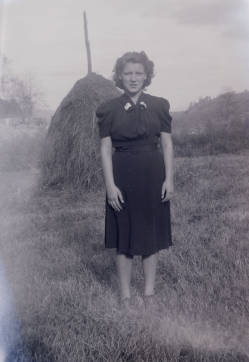 Vera Blair Jessup remembers the hardships of food shortages and rationing during World War II, her community‘s negative reactions to the war, and her brother‘s struggles after coming back shell shocked from the war. Also present during the interview were Kenneth and Pansy Jessup, Vera’s son and daughter-in-law.
Vera Blair Jessup remembers the hardships of food shortages and rationing during World War II, her community‘s negative reactions to the war, and her brother‘s struggles after coming back shell shocked from the war. Also present during the interview were Kenneth and Pansy Jessup, Vera’s son and daughter-in-law.
The Effects of War on Veterans and Families Verification Survey
Fontana Dam: Relocation and Disrupting Communities 1
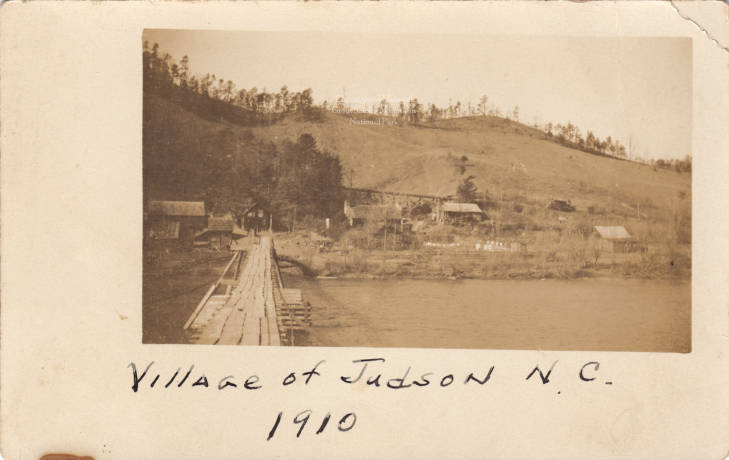
Charles Sanford
 Charles Sanford talks about moving to Fontana Village from a community located on”Old Road” 288 behind the Fontana dam and moving from a house with no running water or electricity to a community which had swimming pools, tennis courts, and other amenities not found in many places at the time, especially those designed for working class families. Also present during the interview is Edsel Newman, son of one of the Dam Kids.
Charles Sanford talks about moving to Fontana Village from a community located on”Old Road” 288 behind the Fontana dam and moving from a house with no running water or electricity to a community which had swimming pools, tennis courts, and other amenities not found in many places at the time, especially those designed for working class families. Also present during the interview is Edsel Newman, son of one of the Dam Kids.
Delia Watkins
 Delia Woodard Watkins, born in Swain County, was 16 when construction started on the Fontana Dam. The Fontana Dam, completed in 1945 by the Tennessee Valley Authority (TVA), is built on the Little Tennessee River and is located near Fontana Village in Graham County, North Carolina. Watkins discusses how Swain County residents were told the dam would help the World War II effort and people were initially supportive of the dam construction believing the power generated from the dam would help win the war. According to Watkins the TVA failed in its promise regarding the amount of power generated. Furthermore, the TVA took more land than needed to build the dam while amount of compensation paid to people who lost their land to dam construction was minimal.
Delia Woodard Watkins, born in Swain County, was 16 when construction started on the Fontana Dam. The Fontana Dam, completed in 1945 by the Tennessee Valley Authority (TVA), is built on the Little Tennessee River and is located near Fontana Village in Graham County, North Carolina. Watkins discusses how Swain County residents were told the dam would help the World War II effort and people were initially supportive of the dam construction believing the power generated from the dam would help win the war. According to Watkins the TVA failed in its promise regarding the amount of power generated. Furthermore, the TVA took more land than needed to build the dam while amount of compensation paid to people who lost their land to dam construction was minimal.
Fontanta Dam: Relocation and Disrupting Communities 1 Verification Survey
Fontana Dam: Relocation and Disrupting Communities 2
Commodore A. Casada
 100 year old Commodore Casada talks about the building of the Fontana Dam, the largest dam of the Tennessee Valley Authority (TVA) system, and its effects on the residents of Bryson City. The Fontana Dam, completed in 1945, is built on the Little Tennessee River and is located near Fontana Village in Graham County, North Carolina.
100 year old Commodore Casada talks about the building of the Fontana Dam, the largest dam of the Tennessee Valley Authority (TVA) system, and its effects on the residents of Bryson City. The Fontana Dam, completed in 1945, is built on the Little Tennessee River and is located near Fontana Village in Graham County, North Carolina.
Doris Couch Clayton
 Doris Couch Clayton talks about living in Tent City which was created to temporarily house the families of Tennessee Valley Authority workers involved in the Fontana Dam project until Fontana Village could be built, Dam Kids reunions, and the constant search to find other Dam Kids who lived there at the time and re-establish contact with them.
Doris Couch Clayton talks about living in Tent City which was created to temporarily house the families of Tennessee Valley Authority workers involved in the Fontana Dam project until Fontana Village could be built, Dam Kids reunions, and the constant search to find other Dam Kids who lived there at the time and re-establish contact with them.
- Where are most of the Dam Kids located now?
- Who had their own separate village? Why?
- Why did the company hire a lot of black and American Indian people?
Fontana Dam: Relocating and Disrupting Communities 2 Verification Survey
Black Oral History Project Group 1
Lin Forney
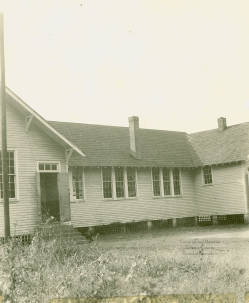 Lin Forney talks about growing up in segregated communities in Western North Carolina in the 1950s and 60s, her memories of the Civil Rights Movement, experiences with school desegregation including resistance from the white students, and the effects of integration on the sense of community.
Lin Forney talks about growing up in segregated communities in Western North Carolina in the 1950s and 60s, her memories of the Civil Rights Movement, experiences with school desegregation including resistance from the white students, and the effects of integration on the sense of community.
Della Jackson
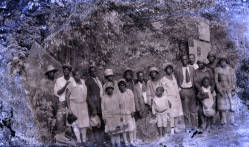 Della Jackson is interviewed by Edward Clark Smith in 1986 as a part of the Western North Carolina Tomorrow Black Oral History Project. Born in 1905, Jackson talks about growing up in Mill Spring where she worked hard on the farm, but didn‘t realize it was work until she was older. She attended Stony Knoll school repeating the seventh grade until a teacher encouraged her to go to Allen Home High School. She eventually went to college and earned her Master‘s degree. She was a teacher at Stony Knoll where at one point she had 68 children in 7 different grades at once. Jackson was very involved in her community and founded the Stony Knoll Community Library in 1937.
Della Jackson is interviewed by Edward Clark Smith in 1986 as a part of the Western North Carolina Tomorrow Black Oral History Project. Born in 1905, Jackson talks about growing up in Mill Spring where she worked hard on the farm, but didn‘t realize it was work until she was older. She attended Stony Knoll school repeating the seventh grade until a teacher encouraged her to go to Allen Home High School. She eventually went to college and earned her Master‘s degree. She was a teacher at Stony Knoll where at one point she had 68 children in 7 different grades at once. Jackson was very involved in her community and founded the Stony Knoll Community Library in 1937.
Black Oral History Project Group 1 Verification Survey
The Way We Worked: Community Leaders and the Impact of Religious Community
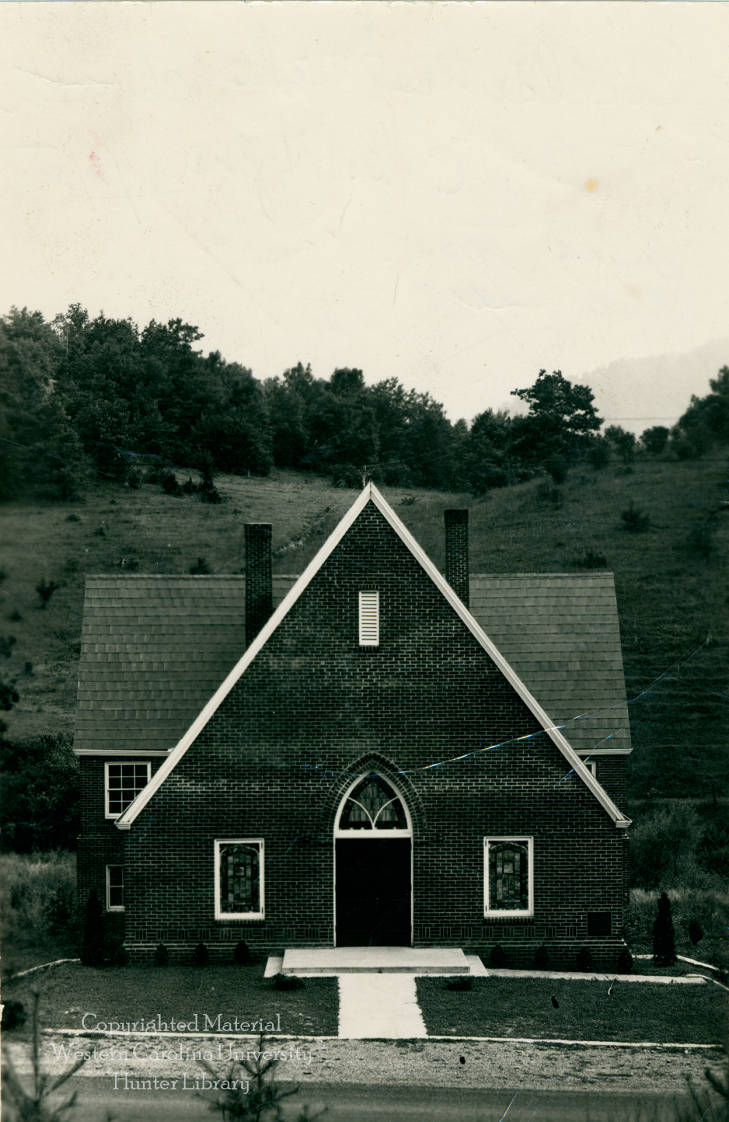
David Reeves
 David Reeves is interviewed by a Smoky Mountain High School student as a part of Mountain People, Mountain Lives: A Student Led Oral History Project. Reeves, born in 1956, talks about growing up on a farm in Haywood County. He tells about the path that led him to become a minister and then an EMT. He tells his most memorable stories as a paramedic. He then talks about the role of the Cullowhee United Methodist Church in the community. He remembers how he and his wife met and how Western Carolina University has changed since he moved here in 2003.
David Reeves is interviewed by a Smoky Mountain High School student as a part of Mountain People, Mountain Lives: A Student Led Oral History Project. Reeves, born in 1956, talks about growing up on a farm in Haywood County. He tells about the path that led him to become a minister and then an EMT. He tells his most memorable stories as a paramedic. He then talks about the role of the Cullowhee United Methodist Church in the community. He remembers how he and his wife met and how Western Carolina University has changed since he moved here in 2003.
Eddie Russel Stillwell
 Eddie Stillwell, a Southern pastor, discusses his experiences within the community and the church. He talks about his mentors and experiences as a pastor over the years, his time helping others with the Baptist Men, and how his past working experience has influenced him. This interview was conducted to supplement the traveling Smithsonian Institution exhibit ‘The Way We Worked,‘ which was hosted by WCU‘s Mountain Heritage Center during the fall 2018 semester.
Eddie Stillwell, a Southern pastor, discusses his experiences within the community and the church. He talks about his mentors and experiences as a pastor over the years, his time helping others with the Baptist Men, and how his past working experience has influenced him. This interview was conducted to supplement the traveling Smithsonian Institution exhibit ‘The Way We Worked,‘ which was hosted by WCU‘s Mountain Heritage Center during the fall 2018 semester.
The Way We Worked: Community Leaders and the Impact of Religious Community Verification Survey
Cherokee Crafters
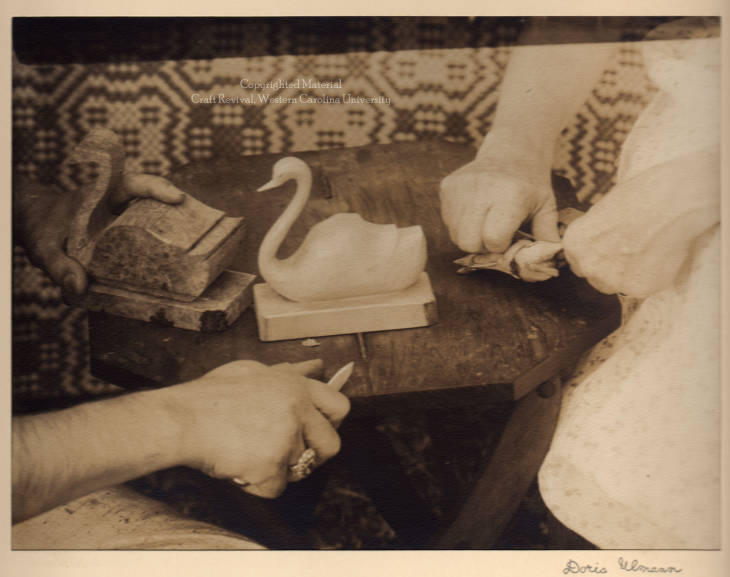
Bernadine George
 Cherokee potter, Bernadine George, discusses how she began making pottery after observing her mother at work, and developed her skills while working and raising her family. She was a founding member of the Cherokee Potters Guild and was one of the first potters to revive the stamped pottery tradition. George also discusses techniques used to make different types of pots, the importance of the quality of the clay and where she gets the stamp patterns she uses in her work. Her enthusiasm is apparent as she talks about how much she enjoys working in schools demonstrating her craft.
Cherokee potter, Bernadine George, discusses how she began making pottery after observing her mother at work, and developed her skills while working and raising her family. She was a founding member of the Cherokee Potters Guild and was one of the first potters to revive the stamped pottery tradition. George also discusses techniques used to make different types of pots, the importance of the quality of the clay and where she gets the stamp patterns she uses in her work. Her enthusiasm is apparent as she talks about how much she enjoys working in schools demonstrating her craft.
Betty Beaver
 Mathew Nickols interviews Betty Beaver on November 24, 2004. Betty talks about her practice of woodcarving and the presence of woodcarving in the surrounding area. Betty describes how she became introduced to woodcarving, her specific practices, how woodcarving began in her immediate area, and the market for wood carved art works.
Mathew Nickols interviews Betty Beaver on November 24, 2004. Betty talks about her practice of woodcarving and the presence of woodcarving in the surrounding area. Betty describes how she became introduced to woodcarving, her specific practices, how woodcarving began in her immediate area, and the market for wood carved art works.
Cherokee Crafters Verification Survey
Navigating Community Change
Principal Chief Joyce Conseen Dugan
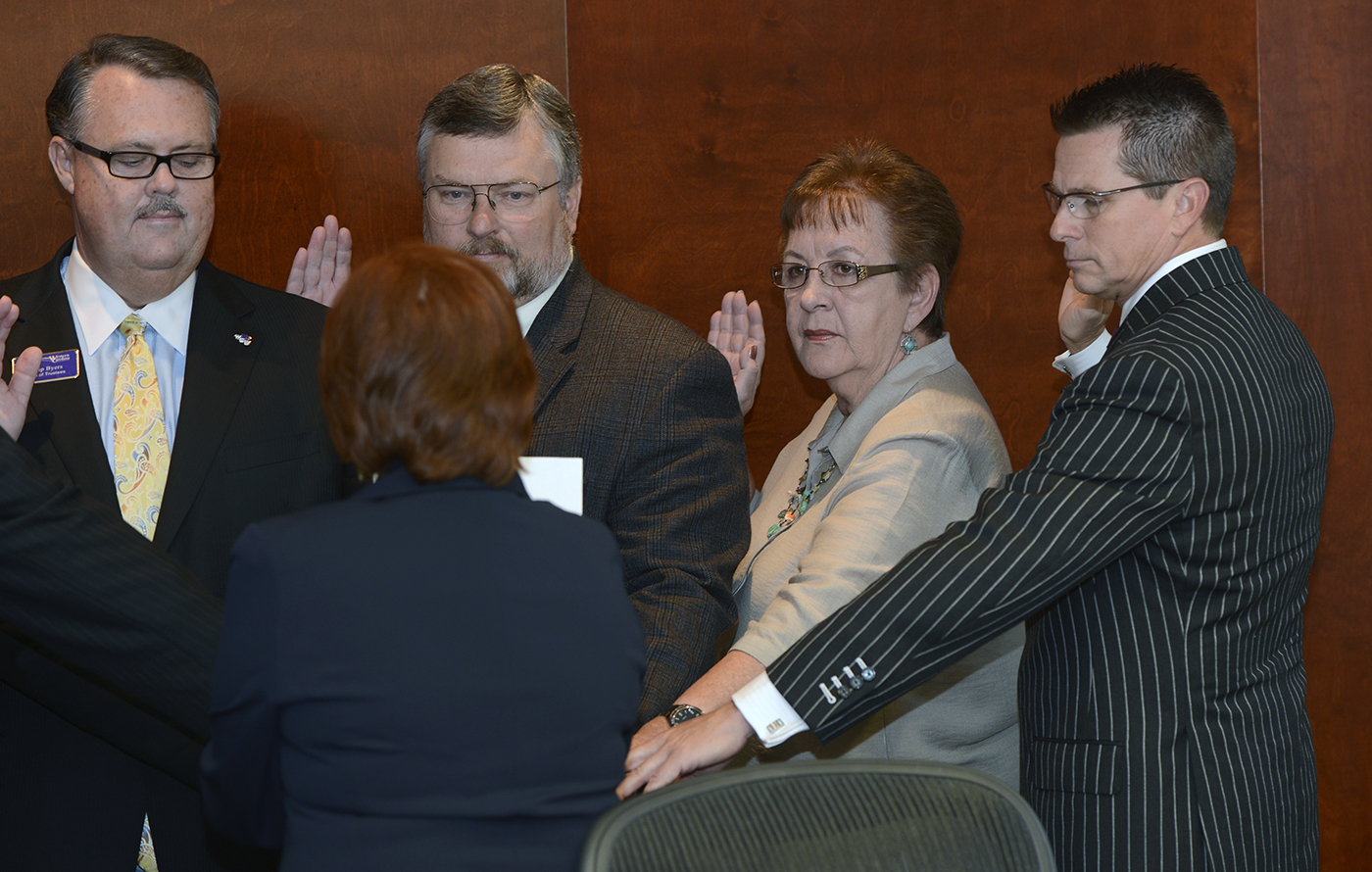 Joyce C. Dugan, who was at this time Principal Chief of the Eastern Band of Cherokee Indians, discusses tourism and the Cherokees. She begins by discussing the history of tourism on the Qualla Boundary, which began during the 1920s and increased when the Great Smoky Mountains National Park was opened due the park’s proximity to the reservation. She then discusses the economic benefits of tourism, as tribal levies have allowed the Cherokee to develop infrastructure, though tourism has led to compromises of traditional values and identity to appeal to tourists. Tourism’s chief benefit has been economic, but Dugan does emphasize the compromises and identifies some level of resentment among the Cherokee over the necessity of tourism to the local economy. She then addresses specific kinds of tourism, saying that in the past the Cherokee had encouraged lower-income tourists with lower cultural expectations, though this has changed over time; Dugan sees a desire for more honest portrayals of Cherokee history and culture, with an emphasis on interactive experiences and authenticity, such as the marketing of traditional crafts. At the time of the interview, Harrah’s Cherokee Casino was yet to open, and Dugan expressed her expectation that the casino would lead to increase in tourism as well as a change in visitor demographics, though she hoped that the casino would simply be one of many attractions and she was hopeful that the community would be able to maintain a balance and not suffer extreme cultural loss. She talks about her desire for tourists to be able to have interactive learning experiences about Cherokee history free of embellishment and with more engagement from the Cherokee people, with more being done at the ceremonial grounds. The interview closes with Dugan expressing her hope that visitors leaving Cherokee have a positive image of the community and think of it as a good place to visit.
Joyce C. Dugan, who was at this time Principal Chief of the Eastern Band of Cherokee Indians, discusses tourism and the Cherokees. She begins by discussing the history of tourism on the Qualla Boundary, which began during the 1920s and increased when the Great Smoky Mountains National Park was opened due the park’s proximity to the reservation. She then discusses the economic benefits of tourism, as tribal levies have allowed the Cherokee to develop infrastructure, though tourism has led to compromises of traditional values and identity to appeal to tourists. Tourism’s chief benefit has been economic, but Dugan does emphasize the compromises and identifies some level of resentment among the Cherokee over the necessity of tourism to the local economy. She then addresses specific kinds of tourism, saying that in the past the Cherokee had encouraged lower-income tourists with lower cultural expectations, though this has changed over time; Dugan sees a desire for more honest portrayals of Cherokee history and culture, with an emphasis on interactive experiences and authenticity, such as the marketing of traditional crafts. At the time of the interview, Harrah’s Cherokee Casino was yet to open, and Dugan expressed her expectation that the casino would lead to increase in tourism as well as a change in visitor demographics, though she hoped that the casino would simply be one of many attractions and she was hopeful that the community would be able to maintain a balance and not suffer extreme cultural loss. She talks about her desire for tourists to be able to have interactive learning experiences about Cherokee history free of embellishment and with more engagement from the Cherokee people, with more being done at the ceremonial grounds. The interview closes with Dugan expressing her hope that visitors leaving Cherokee have a positive image of the community and think of it as a good place to visit.
Dr. Clifford Ramsey Lovin
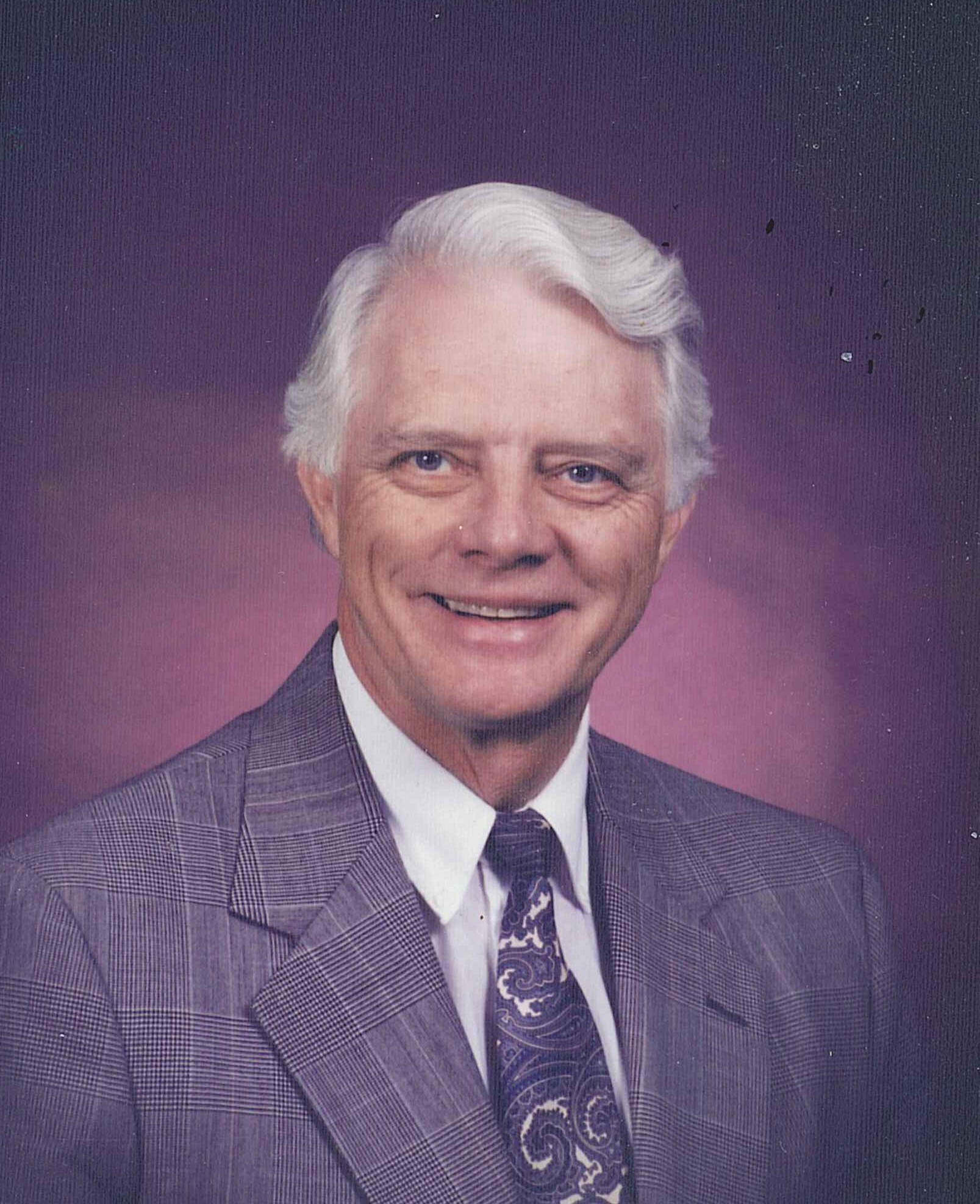 Tony Wagoner interviews Dr. Clifford Ramsey Lovin (1937-2015) on November 13, 2002. Dr. Lovin began teaching at Western Carolina University in 1966 and continued to work for many years as a history professor, and later, Assistant Dean of the School of Arts and Sciences. He talks about his experiences as a professor and with the institution as it underwent many changes; for example, when Jack Carlton was hired as Chancellor in 1973. He also talks about the years under Chancellor Robinson and Coulter, as well. Dr. Lovin talks about the immense changes that WCU has undergone over the years, including changes to campus, the faculty, and the students.
Tony Wagoner interviews Dr. Clifford Ramsey Lovin (1937-2015) on November 13, 2002. Dr. Lovin began teaching at Western Carolina University in 1966 and continued to work for many years as a history professor, and later, Assistant Dean of the School of Arts and Sciences. He talks about his experiences as a professor and with the institution as it underwent many changes; for example, when Jack Carlton was hired as Chancellor in 1973. He also talks about the years under Chancellor Robinson and Coulter, as well. Dr. Lovin talks about the immense changes that WCU has undergone over the years, including changes to campus, the faculty, and the students.
Navigating Community Change Verification Survey
Growing up in Appalachia
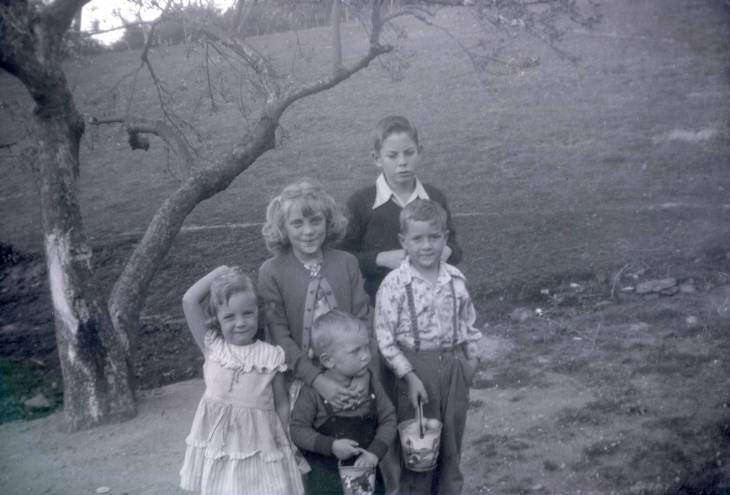
Clifton Fisher
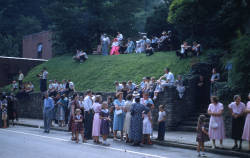 Clifton Fisher is interviewed by a Smoky Mountain High School student as a part of Mountain People, Mountain Lives: A Student Led Oral History Project. Born in 1951, Fisher grew up in Jackson County. He talks about his childhood including playing football for Sylva Webster and winning the championship in 1965 and 1966. Fisher, who worked for Western Carolina University for 32 years and retired as grounds supervisor in 2014 shares the changes he‘s seen at both Western and Jackson County.
Clifton Fisher is interviewed by a Smoky Mountain High School student as a part of Mountain People, Mountain Lives: A Student Led Oral History Project. Born in 1951, Fisher grew up in Jackson County. He talks about his childhood including playing football for Sylva Webster and winning the championship in 1965 and 1966. Fisher, who worked for Western Carolina University for 32 years and retired as grounds supervisor in 2014 shares the changes he‘s seen at both Western and Jackson County.
Edie Burnette
 Edie Burnette discusses growing up in Canton, North Carolina. Burnette and the interviewer discuss her book, which examines the changes of Canton over time. Burnette examines different changes in Canton from the building of I-40 to the environmental impact of the Canton paper mill and the introduction of Folkmoot.
Edie Burnette discusses growing up in Canton, North Carolina. Burnette and the interviewer discuss her book, which examines the changes of Canton over time. Burnette examines different changes in Canton from the building of I-40 to the environmental impact of the Canton paper mill and the introduction of Folkmoot.
Growing up in Appalachia Verification Survey
Individual Recordings
Ashton Woody
 Ashton Woody, a senior English student at WCU, discusses her experiences growing up in Appalachia as a musician and storyteller. This interview was conducted to supplement the traveling Smithsonian Institution exhibit ‘The Way We Worked,‘ which was hosted by WCU‘s Mountain Heritage Center during the fall 2018 semester.
Ashton Woody, a senior English student at WCU, discusses her experiences growing up in Appalachia as a musician and storyteller. This interview was conducted to supplement the traveling Smithsonian Institution exhibit ‘The Way We Worked,‘ which was hosted by WCU‘s Mountain Heritage Center during the fall 2018 semester.
After you listen to the audio, complete the questionnaire for Ashton Woody’s interview.
Betty DuPree
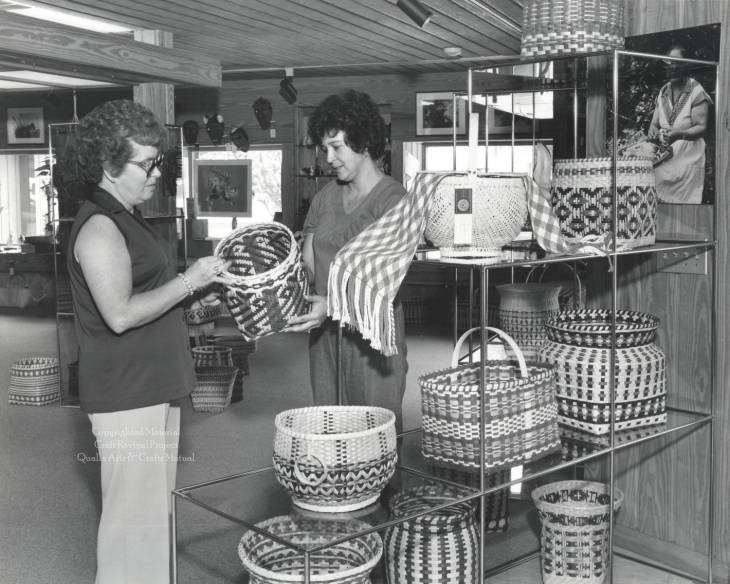 Betty DuPree of Cherokee, the manager of Qualla Arts & Crafts Mutual, begins by discussing the history of Qualla Arts & Crafts, which began in 1946 and has been important in preserving traditional Cherokee crafts and has had a great impact on the local economy. She began working with the organization in the 1970s, and she talks about the administrative and organizational structure of the organization and its dealings with individual craftspeople, as well as its trade with other Indian tribes. DuPree addresses some issues with fraudulent crafts and compliance with federal laws about Indian crafts and the importance of authenticity, and then talks about the importance of tourism to the Cherokee economy and her perception of the tourists who come through the area. She then discusses how crafts are sold through the mail, and tells some anecdotes about some of the more unusual things that the shop has sold and discusses how she promotes the cooperative and what it offers. The interview then shifts to the growth of tourism in Cherokee and how the cooperative‘s business has grown along with it, and she talks about the increasing numbers of people claiming Indian heritage and her attitudes toward them. Tourism is then discussed again, and DuPree talks about how tourists are perceived in the Cherokee community as well as the attitudes of tourists themselves, and their expectations and lack of knowledge about the Cherokee. DuPree also offers the interviewer suggestions of people he should speak with about tourism, and she spends some time talking about foreign perceptions of the Cherokee and other American Indians and the demographics of American tourists in Cherokee and how it changes over the course of the tourist season.
Betty DuPree of Cherokee, the manager of Qualla Arts & Crafts Mutual, begins by discussing the history of Qualla Arts & Crafts, which began in 1946 and has been important in preserving traditional Cherokee crafts and has had a great impact on the local economy. She began working with the organization in the 1970s, and she talks about the administrative and organizational structure of the organization and its dealings with individual craftspeople, as well as its trade with other Indian tribes. DuPree addresses some issues with fraudulent crafts and compliance with federal laws about Indian crafts and the importance of authenticity, and then talks about the importance of tourism to the Cherokee economy and her perception of the tourists who come through the area. She then discusses how crafts are sold through the mail, and tells some anecdotes about some of the more unusual things that the shop has sold and discusses how she promotes the cooperative and what it offers. The interview then shifts to the growth of tourism in Cherokee and how the cooperative‘s business has grown along with it, and she talks about the increasing numbers of people claiming Indian heritage and her attitudes toward them. Tourism is then discussed again, and DuPree talks about how tourists are perceived in the Cherokee community as well as the attitudes of tourists themselves, and their expectations and lack of knowledge about the Cherokee. DuPree also offers the interviewer suggestions of people he should speak with about tourism, and she spends some time talking about foreign perceptions of the Cherokee and other American Indians and the demographics of American tourists in Cherokee and how it changes over the course of the tourist season.
After you listen to the audio, complete the questionnaire for Betty DuPree’s interview.
Dr. Bob Ray
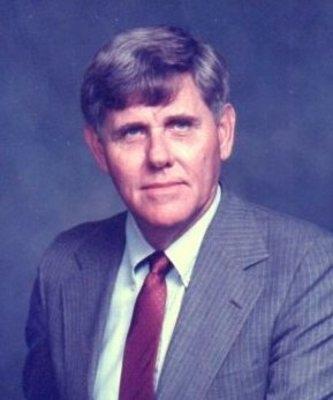 Bob Ray was a student at Western Carolina College from 1952 to 1954 before he was drafted to serve in the Korean Conflict and sent to Germany. He returned in 1957 and graduated thereafter. In this interview, Ray tells about his life as a student-athlete at Western; playing basketball under Coach Gudger; the role of sports in the social life of the campus; and playing with the German national basketball team, while in service, as part of a US Army initiative to improve relations between the countries.
Bob Ray was a student at Western Carolina College from 1952 to 1954 before he was drafted to serve in the Korean Conflict and sent to Germany. He returned in 1957 and graduated thereafter. In this interview, Ray tells about his life as a student-athlete at Western; playing basketball under Coach Gudger; the role of sports in the social life of the campus; and playing with the German national basketball team, while in service, as part of a US Army initiative to improve relations between the countries.
After you listen to the audio, complete the questionnaire for Dr. Bob Ray’s interview.
Channing Taint
 Sierra Jo Kimberlin, stage name Channing Taint, is interviewed by Sarah Steiner as a part of the Gender and Sexuality Oral History project. Taint identifies as a female lesbian and uses drag as an artistic outlet, performing gender fuck drag and as a drag king at The Odditorium, LaZOOM Room, and Ole Shakey’s. She shares her thoughts on drag activism and how her feelings on who can do drag have changed over time. She recalls her first time in drag, discusses drag in western North Carolina, explores how the drag community has changed in Asheville, explains the struggles of being a drag king, and considers the role of drag families.
Sierra Jo Kimberlin, stage name Channing Taint, is interviewed by Sarah Steiner as a part of the Gender and Sexuality Oral History project. Taint identifies as a female lesbian and uses drag as an artistic outlet, performing gender fuck drag and as a drag king at The Odditorium, LaZOOM Room, and Ole Shakey’s. She shares her thoughts on drag activism and how her feelings on who can do drag have changed over time. She recalls her first time in drag, discusses drag in western North Carolina, explores how the drag community has changed in Asheville, explains the struggles of being a drag king, and considers the role of drag families.
After you listen to the audio, complete the questionnaire for Channing Taint’s interview.
Chelsea White
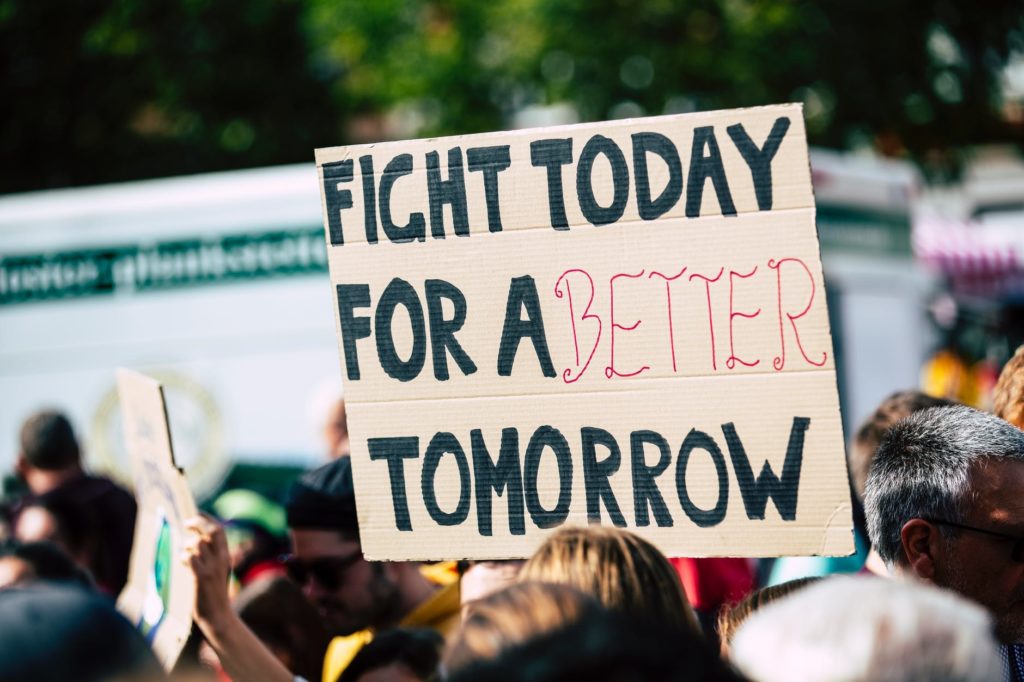 Chelsea White, an Appalachian native and community organizer at Down Home North Carolina, discusses experiences from her childhood and today. She discusses her mission to reconnect communities with their roots in fighting poverty and other problems to give back to the community that raised her and instilled certain values in her of close family and community, religious ideals, and education. This interview was conducted to supplement the traveling Smithsonian Institution exhibit ‘The Way We Worked,‘ which was hosted by WCU‘s Mountain Heritage Center during the fall 2018 semester.
Chelsea White, an Appalachian native and community organizer at Down Home North Carolina, discusses experiences from her childhood and today. She discusses her mission to reconnect communities with their roots in fighting poverty and other problems to give back to the community that raised her and instilled certain values in her of close family and community, religious ideals, and education. This interview was conducted to supplement the traveling Smithsonian Institution exhibit ‘The Way We Worked,‘ which was hosted by WCU‘s Mountain Heritage Center during the fall 2018 semester.
After you listen to the audio, complete the questionnaire for Chelsea White’s interview.
Calvin Carter
 Calvin Carter is interviewed by Gwendolyn Sheppard on February 16 and March 10, 1989 as a part of the Western North Carolina Tomorrow Black Oral History Project. Carter discussed having Indian in his bloodline, how his parents met at the railroads, getting spanked as a child (preferring his mom to do it because she finished quicker), the importance of music to his life, and more.
Calvin Carter is interviewed by Gwendolyn Sheppard on February 16 and March 10, 1989 as a part of the Western North Carolina Tomorrow Black Oral History Project. Carter discussed having Indian in his bloodline, how his parents met at the railroads, getting spanked as a child (preferring his mom to do it because she finished quicker), the importance of music to his life, and more.
After you listen to the audio, complete the questionnaire for Calvin Carter’s interview.
Chris Wilcox
 Chris Wilcox is interviewed by a Smoky Mountain High School student as a part of Mountain People, Mountain Lives: A Student Led Oral History Project. Born in 1973, Wilcox talks about growing up in Sylva with two brothers, training and working as an Emergency Medical Technician, and his career at City Lights Bookstore where he began working in 1997 and became owner of in 2010.
Chris Wilcox is interviewed by a Smoky Mountain High School student as a part of Mountain People, Mountain Lives: A Student Led Oral History Project. Born in 1973, Wilcox talks about growing up in Sylva with two brothers, training and working as an Emergency Medical Technician, and his career at City Lights Bookstore where he began working in 1997 and became owner of in 2010.
After you listen to the audio, complete the questionnaire for Chris Wilcox’s interview.
Clarence Benton
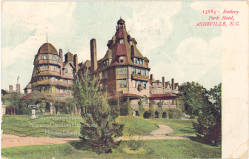 In this interview, Clarence Benton of Asheville discusses his experiences working as a waiter for several hotels in Asheville, including the Battery Park Hotel and Grove Park Inn, during the period from the mid-1950s to 1965. He talks about learning to do the job from older waiters and the patterns of his work. Benton, an African American man, also discusses the impact of the tourism industry on Asheville’s African American community and talks about the community’s social standing in the city. He offers comparisons between several of the hotels in Asheville and talks about African Americans in the service industry as a whole.
In this interview, Clarence Benton of Asheville discusses his experiences working as a waiter for several hotels in Asheville, including the Battery Park Hotel and Grove Park Inn, during the period from the mid-1950s to 1965. He talks about learning to do the job from older waiters and the patterns of his work. Benton, an African American man, also discusses the impact of the tourism industry on Asheville’s African American community and talks about the community’s social standing in the city. He offers comparisons between several of the hotels in Asheville and talks about African Americans in the service industry as a whole.
After you listen to the audio, complete the questionnaire for Clarence Benton’s interview.
Christine Cole Proctor and James L. Sizemore
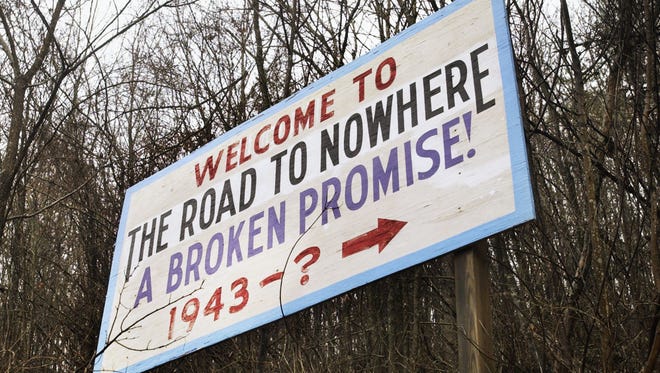 Christine Cole Proctor speaks about how her family and others were moved from their homes so that the Fontana Dam could be built. The Dam, completed in 1945 by the Tennessee Valley Authority (TVA), is built on the Little Tennessee River and is located near Fontana Village in Graham County, North Carolina. Cole also mentions the cementaries that the TVA had intitially acquired from the community but had later neglected to maintain. James L.Sizemore, whose family owned approximately 1,000 acres on the North Shore of the Fontana Dam, discusses how the building of the Fontana Dam and the Great Smoky Mountains National Park resulted in widespread displacement of people in Swain and Graham counties. Proctor and Sizemore also mention a road that was supposed to have been built by the Park authorities on land that had been acquired by the Park from the TVA.
Christine Cole Proctor speaks about how her family and others were moved from their homes so that the Fontana Dam could be built. The Dam, completed in 1945 by the Tennessee Valley Authority (TVA), is built on the Little Tennessee River and is located near Fontana Village in Graham County, North Carolina. Cole also mentions the cementaries that the TVA had intitially acquired from the community but had later neglected to maintain. James L.Sizemore, whose family owned approximately 1,000 acres on the North Shore of the Fontana Dam, discusses how the building of the Fontana Dam and the Great Smoky Mountains National Park resulted in widespread displacement of people in Swain and Graham counties. Proctor and Sizemore also mention a road that was supposed to have been built by the Park authorities on land that had been acquired by the Park from the TVA.
After you listen to the audio, complete the questionnaire for Christine Cole Proctor and James L. Sizemore’s interview.
Dr. Don Livingston
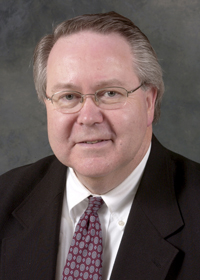 James Taylor interviews Dr. Don Livingston about the history of the Political Science department at WCU. Dr. Livingston received his Bachelors and Master‘s degrees from the University of South Carolina and his PhD from the University of Mississippi and began teaching at WCU in 1984. He discusses the changes in the political science department including faculty, student enrollment, and the curriculum.
James Taylor interviews Dr. Don Livingston about the history of the Political Science department at WCU. Dr. Livingston received his Bachelors and Master‘s degrees from the University of South Carolina and his PhD from the University of Mississippi and began teaching at WCU in 1984. He discusses the changes in the political science department including faculty, student enrollment, and the curriculum.
After you listen to the audio, complete the questionnaire for Dr. Don Livingston’s interview.
Dorris Moore
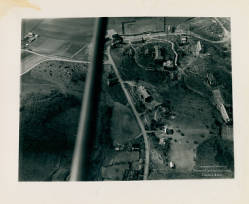 Dorris Moore talks about attending Western Carolina Teacher’s College in the mid 1940‘s, about men getting drafted, the war changing life on campus, and in her community back home.
Dorris Moore talks about attending Western Carolina Teacher’s College in the mid 1940‘s, about men getting drafted, the war changing life on campus, and in her community back home.
After you listen to the audio, complete the questionnaire for Dorris Moore’s interview.
Dorothy Jean Mincey
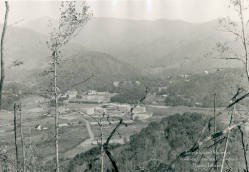 Dorothy Jean Mincey is interviewed by a Smoky Mountain High School student as a part of Mountain People, Mountain Lives: A Student Led Oral History Project. Born in 1927, Mincey talks about growing up in the mountains of Jackson County after her father died. She describes attending school on Western Carolina University’s campus and completing her bachelors and masters from the University. She also talks about the difficulties of holding a teaching job while raising a family in the 50s and 60s.
Dorothy Jean Mincey is interviewed by a Smoky Mountain High School student as a part of Mountain People, Mountain Lives: A Student Led Oral History Project. Born in 1927, Mincey talks about growing up in the mountains of Jackson County after her father died. She describes attending school on Western Carolina University’s campus and completing her bachelors and masters from the University. She also talks about the difficulties of holding a teaching job while raising a family in the 50s and 60s.
After you listen to the audio, complete the questionnaire for Dorothy Jean Mincey’s interview.
Dorothy Watson Hooper
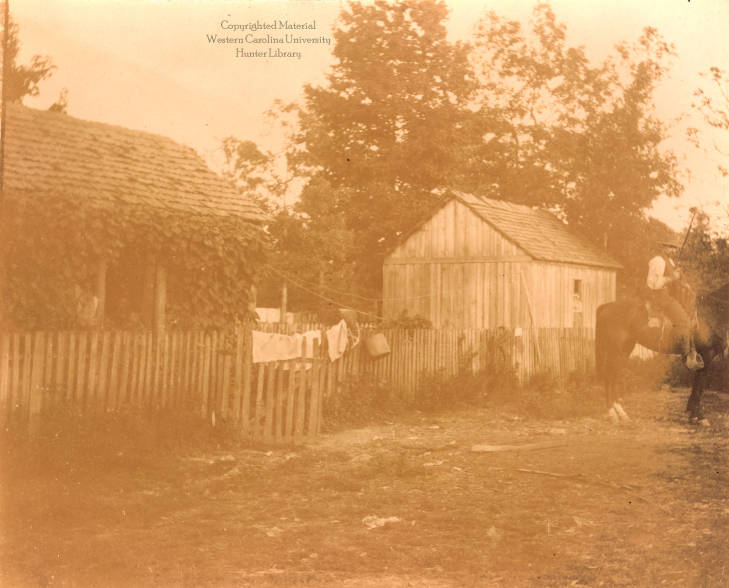 Dorothy Watson Hooper discusses the Hooper-Watson feud, its origins in conflicting loyalties during the Civil War, escalation from minor fights and vandalism to murder, and how a couple of generations later the feud dwindled with the Hooper and Watson children and grandchildren even getting married to each other.
Dorothy Watson Hooper discusses the Hooper-Watson feud, its origins in conflicting loyalties during the Civil War, escalation from minor fights and vandalism to murder, and how a couple of generations later the feud dwindled with the Hooper and Watson children and grandchildren even getting married to each other.
After you listen to the audio, complete the questionnaire for Dorothy Watson Hooper’s interview.
Dot Queen Conner
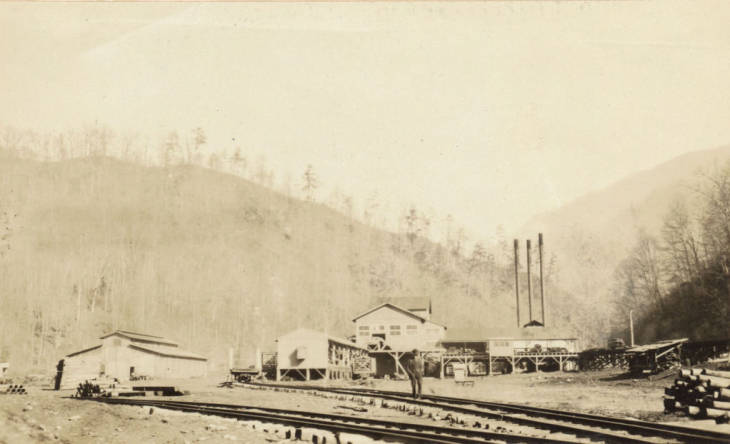 Skagit and Snohomish Counties in Washington saw an influx of Western North Carolina migrants between 1900 and 1950 settling in Darrington, Sedro-Woolley and Lyman and bringing their customs, culture, and traditions. In 1947 the census shows 500 out of Darrington‘s 850 person population were from WNC. Still today, 85% of Darrington‘s population has ties to WNC, mostly from Jackson County. As the timber industry depleted resources in Southern Appalachia, many people followed large-scale logging operations out to the Pacific Northwest which came to be knows as the Great Migration. In this 2017 interview Dot Queen Conner discusses her father‘s time working in Washington and how the Washington Migration had an effect on her life.
Skagit and Snohomish Counties in Washington saw an influx of Western North Carolina migrants between 1900 and 1950 settling in Darrington, Sedro-Woolley and Lyman and bringing their customs, culture, and traditions. In 1947 the census shows 500 out of Darrington‘s 850 person population were from WNC. Still today, 85% of Darrington‘s population has ties to WNC, mostly from Jackson County. As the timber industry depleted resources in Southern Appalachia, many people followed large-scale logging operations out to the Pacific Northwest which came to be knows as the Great Migration. In this 2017 interview Dot Queen Conner discusses her father‘s time working in Washington and how the Washington Migration had an effect on her life.
After you listen to the audio, complete the questionnaire for Dot Queen Conner’s interview.
Doug Gibson
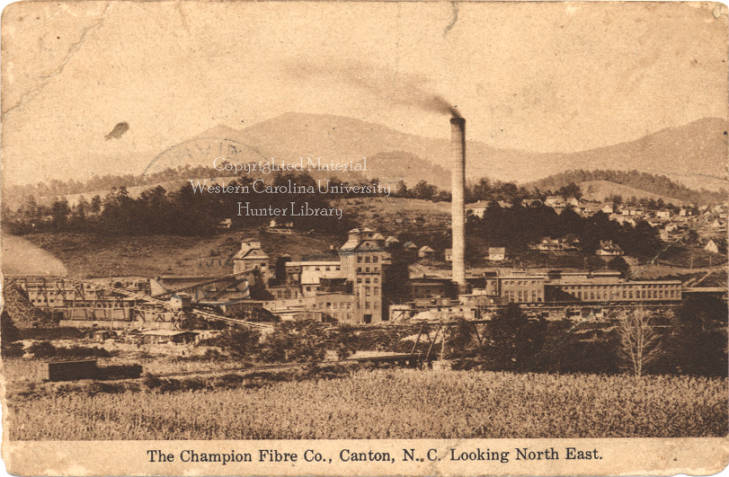 Doug Gibson shares his experience working at the Champion Paper Mill through the 70s, 80s and 90s. In 1972, when Gibson began work, Champion changed its name to Champion International Corporation and soon after starting he joined the union. Gibson talks about his role on the employee shared ownership committee, the employee buyout resulting in the formation of Blue Ridge Paper Company, environmental issues, and the sale of the company to Evergreen Packaging.
Doug Gibson shares his experience working at the Champion Paper Mill through the 70s, 80s and 90s. In 1972, when Gibson began work, Champion changed its name to Champion International Corporation and soon after starting he joined the union. Gibson talks about his role on the employee shared ownership committee, the employee buyout resulting in the formation of Blue Ridge Paper Company, environmental issues, and the sale of the company to Evergreen Packaging.
After you listen to the audio, complete the questionnaire for Doug Gibson’s interview.
Mrs. Eliza Jane Coward Thomas
 Eliza Jane Coward Thomas is interviewed by Lorraine Crittenden on May 6, 1986 as a part of the Western North Carolina Tomorrow Black Oral History Project. Thomas was born on Long Branch in Cullowhee in 1893. She talks about her childhood in Jackson County where she grew up living with her uncle in a tight knit community. She describes Asheville and working for E. B. Glenn, a doctor at Meriwether Hospital, watching his children, cleaning, and cooking and then working for the Frye family. Thomas had a good experience with both families and good relationships with white people in general her entire life.
Eliza Jane Coward Thomas is interviewed by Lorraine Crittenden on May 6, 1986 as a part of the Western North Carolina Tomorrow Black Oral History Project. Thomas was born on Long Branch in Cullowhee in 1893. She talks about her childhood in Jackson County where she grew up living with her uncle in a tight knit community. She describes Asheville and working for E. B. Glenn, a doctor at Meriwether Hospital, watching his children, cleaning, and cooking and then working for the Frye family. Thomas had a good experience with both families and good relationships with white people in general her entire life.
After you listen to the audio, complete the questionnaire for Mrs. Eliza Jane Coward Thomas’s interview.
Mrs. Elizabeth Mary Hyatt Gibson
 Elizabeth Mary Hyatt Gibson is interviewed by Lorraine Crittenden on April 29, 1986 as a part of the Western North Carolina Tomorrow Black Oral History Project. Born in 1906, Gibson grew up in the Webster / Little Savannah area of Jackson County. She talks about being able to walk the seven miles to school only if she was caught up on her chores. She describes her mother‘s in-home laundry business. Gibson married at the age of thirteen in order to get away from home. She also recalls two or three major floods, church, and interactions with her white neighbors.
Elizabeth Mary Hyatt Gibson is interviewed by Lorraine Crittenden on April 29, 1986 as a part of the Western North Carolina Tomorrow Black Oral History Project. Born in 1906, Gibson grew up in the Webster / Little Savannah area of Jackson County. She talks about being able to walk the seven miles to school only if she was caught up on her chores. She describes her mother‘s in-home laundry business. Gibson married at the age of thirteen in order to get away from home. She also recalls two or three major floods, church, and interactions with her white neighbors.
After you listen to the audio, complete the questionnaire for Mrs. Elizabeth Mary Hyatt Gibson’s interview.
Evangeline Gibbs
 Evangeline Thompson Gibbs is interviewed by Lorraine Crittenden on September 10, 1986 as a part of the Western North Carolina Tomorrow Black Oral History Project. Gibbs‘ parents were the first black people to buy a house on Meadow Street in Waynesville. Her father was also the first and only black barber and her daughter was the first black nurse in Waynesville. Her mother was educated by the Love Stringfield family and Gibbs herself later worked for Dr. Stringfield. Gibbs‘ father was a Mason and her mother was a member of the Order of the Eastern Star. Gibbs recounts her schooling, growing up in a white neighborhood, playing music, and more.
Evangeline Thompson Gibbs is interviewed by Lorraine Crittenden on September 10, 1986 as a part of the Western North Carolina Tomorrow Black Oral History Project. Gibbs‘ parents were the first black people to buy a house on Meadow Street in Waynesville. Her father was also the first and only black barber and her daughter was the first black nurse in Waynesville. Her mother was educated by the Love Stringfield family and Gibbs herself later worked for Dr. Stringfield. Gibbs‘ father was a Mason and her mother was a member of the Order of the Eastern Star. Gibbs recounts her schooling, growing up in a white neighborhood, playing music, and more.
After you listen to the audio, complete the questionnaire for Evangeline Gibbs’s interview.
Faustine McDonald Wilson
 Faustine McDonald Wilson, a designer and small business owner of Survival Pride, discusses the challenges she has faced growing up, with her brother’s death, and how that tragedy defined her store brand and changed her life. She also talks about her passions and why her store went from brick and mortar to mobile/online. This interview was conducted to supplement the traveling Smithsonian Institution exhibit ‘The Way We Worked,‘ which was hosted by WCU‘s Mountain Heritage Center during the fall 2018 semester.
Faustine McDonald Wilson, a designer and small business owner of Survival Pride, discusses the challenges she has faced growing up, with her brother’s death, and how that tragedy defined her store brand and changed her life. She also talks about her passions and why her store went from brick and mortar to mobile/online. This interview was conducted to supplement the traveling Smithsonian Institution exhibit ‘The Way We Worked,‘ which was hosted by WCU‘s Mountain Heritage Center during the fall 2018 semester.
After you listen to the audio, complete the questionnaire for Faustine McDonald Wilson’s interview.
Susie Bryson
 Susie Bryson is interviewed by Lorraine Crittenden on April 28, 1986 as a part of the Western North Carolina Tomorrow black oral history project. Bryson talks about schools before they were integrated, the black church being where Robinson Hall is now (AME Mt. Zion), how special Christmas was to her growing up, the progressiveness of Asheville, and more.
Susie Bryson is interviewed by Lorraine Crittenden on April 28, 1986 as a part of the Western North Carolina Tomorrow black oral history project. Bryson talks about schools before they were integrated, the black church being where Robinson Hall is now (AME Mt. Zion), how special Christmas was to her growing up, the progressiveness of Asheville, and more.
The audio is this interview is faint, so we recommend listening with headphones.
After you listen to the audio, complete the questionnaire for Susie Bryson ‘s interview.
Taylor
 Taylor, a dancer, discusses her different experiences growing up on a farm in Amish country and working as a stripper. She talks about feminism, sexuality, and her views on people in the industry as a whole. This interview was conducted to supplement the traveling Smithsonian Institution exhibit ‘The Way We Worked,‘ which was hosted by WCU‘s Mountain Heritage Center during the fall 2018 semester.
Taylor, a dancer, discusses her different experiences growing up on a farm in Amish country and working as a stripper. She talks about feminism, sexuality, and her views on people in the industry as a whole. This interview was conducted to supplement the traveling Smithsonian Institution exhibit ‘The Way We Worked,‘ which was hosted by WCU‘s Mountain Heritage Center during the fall 2018 semester.
After you listen to the audio, complete the questionnaire for Taylor’s interview.
Troy and Edna Whiteside
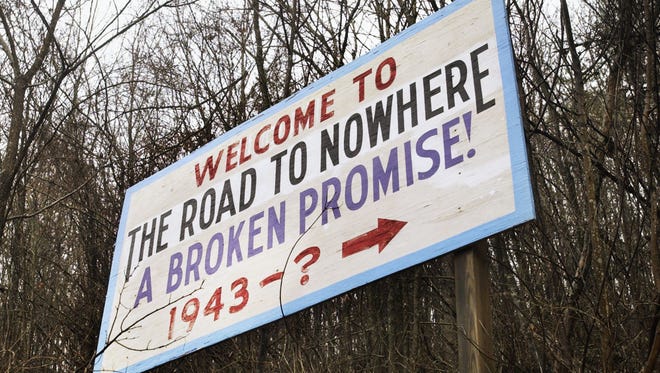 Troy and Edna Whiteside talk about the ambivalent feelings that Swain County residents had towards the construction of the Fontana Dam. While the dam’s construction resulted in people losing land in return for inadequate compensation and having to relocate, it also brought jobs to the area. The largest dam of the Tennessee Valley Authority (TVA) system, Fontana Dam is built on the Little Tennessee River and was completed in 1945.
Troy and Edna Whiteside talk about the ambivalent feelings that Swain County residents had towards the construction of the Fontana Dam. While the dam’s construction resulted in people losing land in return for inadequate compensation and having to relocate, it also brought jobs to the area. The largest dam of the Tennessee Valley Authority (TVA) system, Fontana Dam is built on the Little Tennessee River and was completed in 1945.
After you listen to the audio, complete the questionnaire for Troy and Edna Whiteside’s interview.